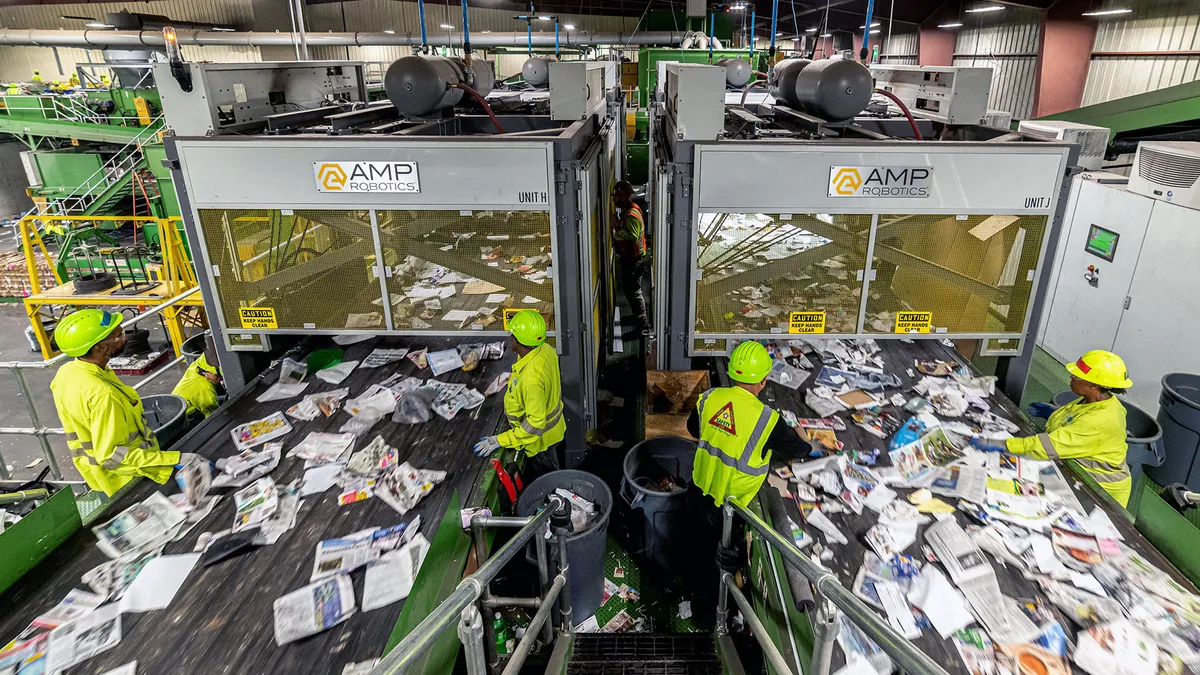Dive Brief:
- AMP will partner with Waste Connections to build and operate a new MRF in Commerce City, Colorado. The artificial intelligence-powered facility, which will be owned by Waste Connections and operated by AMP, is expected to open in early 2026.
- The greenfield project will be Waste Connections’ first MRF in Colorado. It will be able to process up to 62,000 tons of single-stream recycling annually, the companies said in a news release.
- The facility will use a AMP One system, a custom building plan the company describes as a “zero-manual-sort” MRF that can be configured and optimized for various materials. The operational flexibility is meant to help Waste Connections adapt to changes in Colorado’s recycling market.
Dive Insight:
Colorado’s waste hauling landscape is particularly competitive, the companies say, and Waste Connections sees a focus on AI-powered sorting technology as an important strategy to continue to grow the business in the region.
The state is also poised to begin implementing an extended producer responsibility program for packaging, which the companies expect will influence recycling markets in the region. The new MRF will allow Waste Connections to adjust its scale and sorting capabilities as those changes take effect, said Mark Ceresa, the company’s division vice president.
“We just know that there's going to be a bigger market for recycling going forward because of EPR, and we'd like to meet that demand,” he said. “We feel as though the entire state of Colorado is going to need these types of facilities to be online, and we want to get out ahead of it.”
Upcoming EPR deadlines include a state recycling system plan expected in February, which could give companies like Waste Connections insight into market changes. Plan implementation is expected in January 2026.
The MRF will be equipped with AMP’s equipment, which uses AI not only to sort materials but to monitor material purity and adjust efficiency. The facility will also be designed so the system can automatically detect problems such as jams or “drops in performance,” then automatically adjust equipment in real time, AMP said in a news release.
The Commerce City MRF will process recycling volumes across the state, including from major cities north and south of the Denver area such as Colorado Springs and Fort Collins, Ceresa said. Waste Connections currently sends the volumes it collects to third-party MRFs in the region.
Waste Connections already uses about 50 of AMP’s AI-powered robotic systems throughout North America, which the companies say make it the largest AI MRF operator in the sector. The Commerce City MRF will be the first time the companies have partnered on building an entire MRF, said AMP CEO Tim Stuart.
The agreement for AMP to design and operate the Commerce City facility was an ideal scenario for Waste Connections, Ceresa said. “Having them run the facility as well as provide the equipment, gave us the ability to de-risk what we were walking into with this MRF,” he said.
Stuart said it’s also an opportunity for AMP to identify other areas in the competitive Colorado market where it can offer its equipment and services.
“Being more efficient obviously makes you more competitive, makes you look to grow your business,” he said.
AMP has recently built AMP ONE facilities in Cleveland, Ohio; Portsmouth, Virginia, and Pitt County, North Carolina. In the near future, “we have a lot in the pipeline on AMP ONE, both with Connections and some other companies,” he said.
Waste Connections is working on expanding its overall recycling efforts across the company and has a goal to increase recycling by 50% from a 2018 baseline. Waste Connections recycled 2.21 million tons of material in 2023, according to its recent sustainability report.















